#unexpectedly well
Explore tagged Tumblr posts
Text

YEEEEEAAAAAAHHHHH
#art#twisted wonderland#twisted wonderland spoilers#twisted wonderland episode 7 spoilers#twisted wonderland book 7 spoilers#twisted wonderland episode 7 part 12 spoilers#twisted wonderland book 7 part 12 spoilers#unique magic posters#mmmm delicious crumbs of che'nya appearances#gosh! ace's dream was unexpectedly SO cute and sweet#and trey's dream started out SO cute and sweet#and then#well#uhhhhh#i feel like we've all learned more about trey 'i'm just a normal boring regular guy' clover than we maybe wanted to#cater: i'm starting to think maybe something is seriously wrong with trey-kun <- good summary senpai#we're 20+ dudes in and it just keeps getting weirder somehow#chapter 12 is killing me and the rest of february is going to finish the job#getting chokeslammed by that rapunzel event announcement#yes yes YES give me pretty floaty princess dresses and sparkles!!!!!#SHOW ME THE ~EVENING SKY CHIFFON~ JACK I NEED TO SEE HIM IMMEDIATELY
3K notes
·
View notes
Text
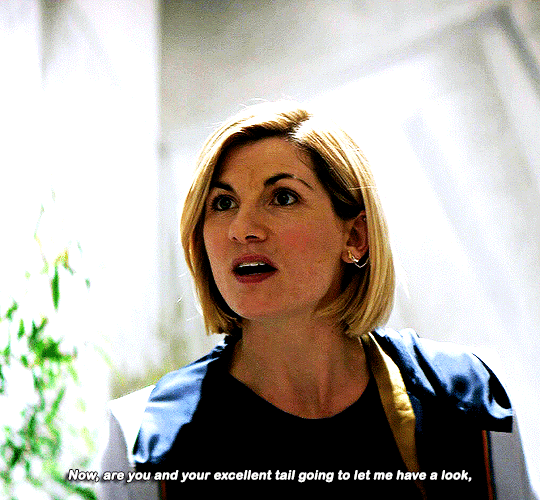

Guests aren't permitted in the... linen cupboard. How about Pan-galactic Standards and Practices Officer? Health and Safety? Security and Hygiene? Resort Inspector?
DOCTOR WHO Orphan 55
#dwedit#doctor who#thirteenth doctor#usertennant#usertoph#miatendos#userdiana#*#first gifset of 2024 :')#had to start off w a banger#this was unexpectedly difficult to color tho and it looks a thousand times better on desktop than in the app. but oh well#i'd bark at her any day <3
671 notes
·
View notes
Text
Nah you're killing me, going bonkers over here




(zero clue what i was doing but i was having fun)
Also the og photos???? (the refences i used) so good 10/10 wild
#art#drawing#fanart#portrait#slipknot#slipknot fanart#slipknot band#corey taylor#digital fanart#digital drawing#digital art#thanks to everyone liking reblogging etc :D#this post is doing unexpectedly well tysm
192 notes
·
View notes
Text
Beck: Paige, there’s someone I’d like you to meet.
Paige: That’s the real Tron? He’s alive? Then…no offense, but why did he need you to be the Renegade?
Tron: Reasons.
Beck: Shut it. Now look, I want the both of you to get along.
Tron: As long as you like her and she doesn’t betray us, I’m happy.
Beck: Oh. Really? Great!
Tron: Paige, if you hurt him, they’ll never stop finding your remains.
Paige: I wouldn’t expect anything less.
Beck: What did I JUST say?
#tron#tron uprising#paige tron#paige#beck#beck tron#tronblr#this is her being both a) yep from what I’ve heard Tron would do something like this#and b) ok fair I’d do the same#Paige: I’ve only had Beck for a day and a half but if anything happened to him#I’d kill everyone on this ship and then myself#Tron: Same#I love the way Tron is unexpectedly supportive of Beck’s crush#the classic grouchy mentor route would be ‘iT’s ClOuDiNg YoUr FoCuS’#but Tron goes ‘well when you’ve been hit by a crush you gotta do what you gotta do just be careful’#I feel he and Paige would slowly develop uneasy respect#and eventually become friends#Her having just become disillusioned with the cause she believed in so strongly#And maybe even having found out Tesler betrayed her from the very beginning#And that she lost her home and friends to it#Tron who knows betrayal and loss very well#And they both REALLY care about Beck#which brings them together even when they’re skeptical of each other initially#And they’d both be violently protective even though he can kinda take care of himself by this point#Beck: Hey! This is my dad and my girlfriend#Tron and Paige: *both polishing weapons menacingly*#renepaige
61 notes
·
View notes
Text
I wonder how Galbatorix felt when he found out that two teens he was looking for, who were literally in different parts of Alagaësia, somehow met and decided to team up
#Roran Murtagh and Eragon successfully escaped#well technically Galbatorix knew where Murtagh had been but still Murtagh managed to unexpectedly run away#eragon#Murtagh#roran stronghammer#murtagh morzansson#inheritance cycle
62 notes
·
View notes
Text
One Piece Academy chapter 47: Lost Dog part 1 (Quick translation)
source | index
(Law and Cora don't appear in this week's part, we'll see them next week!)
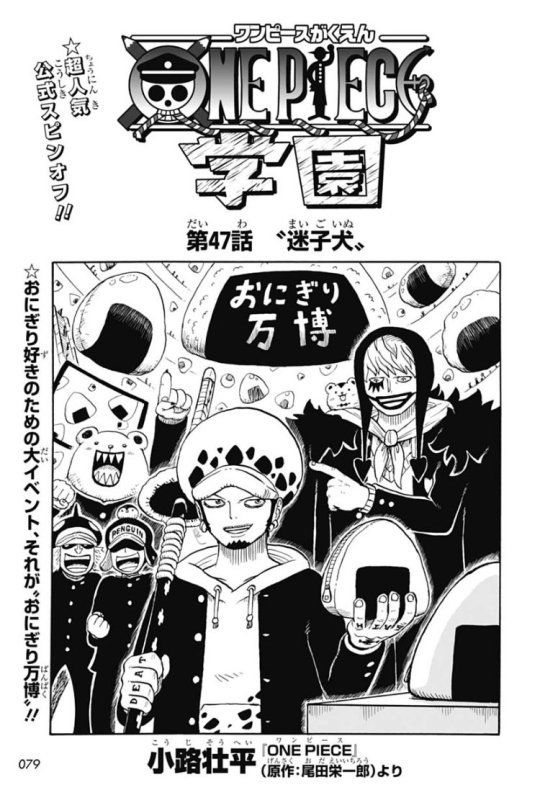
"A Grand festival for Onigiri lovers, the Onigiri Expo!"

<What appears before Luffy's brother Ace kun is... Onigiri? >
Onigiri: Waff!
Ace: The heck are you?
[Title Card: New World High "Moby Dick School" 2nd year, Fire fist Ace kun]
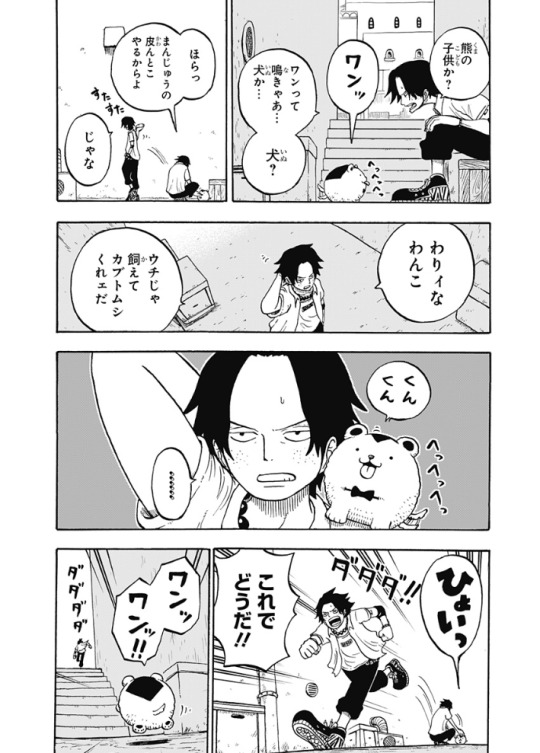
Ace: A baby bear?
Onigiri: Waff!
Ace: If it waffs then dog, I guess...You a pup?
Onigiri: *huff* *huff*
Ace: Here, take the skin of my steamed bun. See ya.
(walks away)
Sorry, doggo. I can keep a beetle at best as a pet.
Onigiri: (look at him rofl)
Ace:.....
Hoop!
*puts Onigiri down*
*starts running*
HOW 'BOUT THAT??
Onigiri: Waff! Waff!

Onigiri: *plops*
Ace: !
(Don't look back...!!) *dragging himself*
(rip dog)
Ace: DARN IT!!

Ace: Fine, fiine... my loss.
Well, it's definitely a lost dog so that takes some weight off... let's search for your master, shall we?
Onigiri: *marveled at butterflies*
Ace: Try actin' like a lost dog, will you...
Well, let's go! Er...... Norimochi!
Onigiri:.....
Ace:.... Guess that's not the name.
(T/N: Norimochi is mochi wrapped seaweed so Ace was pretty close! Reminder that Onigiri is named by Luffy, so the bothers have a similar naming tendency lol)
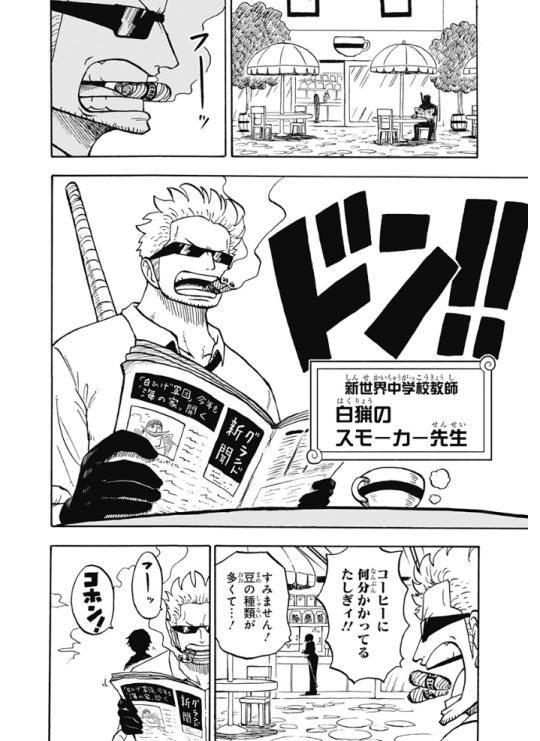
<DOOON! >
[Title card: Faculty, New World Middle School
White Chase Smoker sensei]
Smoker: How long does a freaking cup of coffee take? Tashigi!!!
Tashigi: I'm sorry! There are so many types of beans;;
Someone: *light coughs*

Ace: Sorry for the inconvenience, but... do you perhaps recognize this dog?
Smoker:
Ace: 'guess not? Sorry for the trouble! 👋🏼
Smoker: You!!
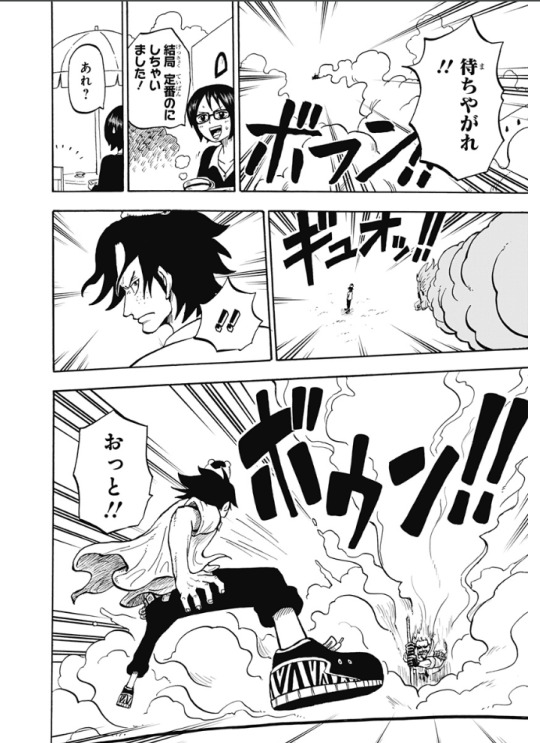
Smoker: HOLD IT RIGHT THERE!
Tashigi: *brings coffee* Decided to go with the regular after all!...Huh?
Ace:!!
Oop!!

Ace: The dude from earlier.. ain't that too flashy for a greeting?
Smoker: You sure look carefree... Whitebeard corps second commander, Portgas D. Ace.
Ace: Mm? You're that guy from Luffy's class! If I remember right, smokey-
Smoker: It's Smoker!
Ace: Right, Smoker sensei, tutoring my li'l brother.
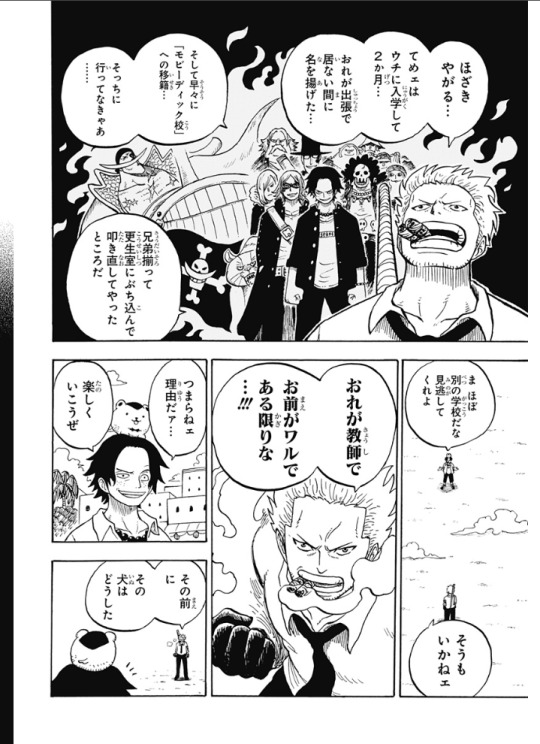
Smoker: Cut the crap. You stayed at our school for two months, made a name while I was away on a business trip, then quickly transferred to Moby Dick School branch.
Only if you hadn't moved there... I would've thrown you and your brother into the reform room and straightened you out!
Ace: Well, now I'm practically in a different school, so let all that slide, maybe?
Smoker: No can do. As long as I'm a teacher, and you're a thug!
Ace: What a boring reason.
Aight, let's have fun!
Smoker: But before that, why's that dog with you?
Continues in Reblog ⬇️
#the last sentence is more like “whatsup with [that] dog” as in smoker can recognize which dog it is hah#curiously it seems the author is building some plot connection between law and smoker#well anyway#unexpectedly ace and smokey centric and ace's speech is so much fun to translate haha#one piece#one piece party#portgas d ace#one piece smoker#white chase smoker#fire fist ace#one piece onigiri#trafalgar law#donquixote rosinante#heart pirates#my translations#one piece translations
145 notes
·
View notes
Text
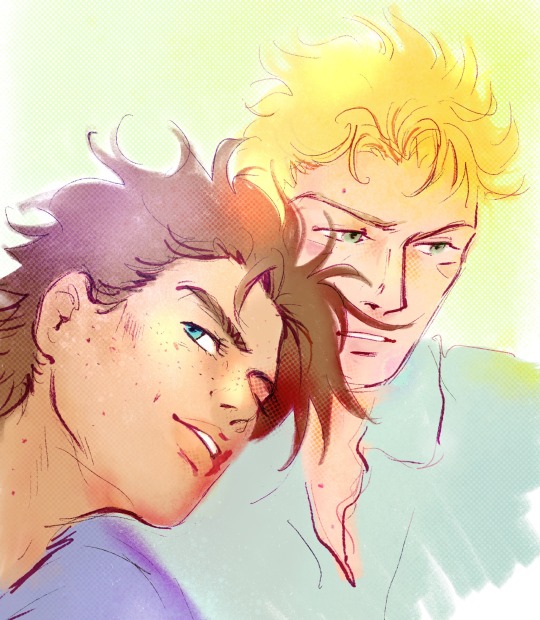
#Old thing i never shared either#Might disappear unexpectedly so might as well feed the ai or whatever 🤷🏻♀️ (I’m joking but truly ai « art » taking over the world makes#me very very sad. Everything feels even more pointless.)#Caejose#Apparently in ur tumblr settings you can tick the « do not share my content with third parties » or something like that
147 notes
·
View notes
Text

Blue: A Retelling of "The Blue Castle" by M.J. Rednow
Valancy is not a rebel. Every moment of her day is controlled by the artificial intelligence that monitors her movements, but she doesn't dare to resist strict rules of Stirling Society. Any who object are cast out of their safe city and banished to the toxic, dangerous Wilderness. Yet Valancy dreams of freedom, inspired by the secretly subversive writings of John Foster. His supposedly scientific texts speak of the beauty of nature and spark thoughts of society beyond Stirling control--yet, for Valancy, these can be nothing more than dreams. Then the infallible AI medical doctor informs Valancy that she has less than a year to live. Valancy realizes that she doesn't want to die never having lived, and she begins to push back against the restrictions of her life. She speaks out against the pointless rules, helps an invalid deemed useless to society, and is eventually cast out into the Wilderness, where she marries a mysterious outcast who teaches her to brave the wonders and terrors of nature--and maybe, to bring down the Stirling society once and for all.
#imaginary book recs#the blue castle#l.m. montgomery#my ya teen dystopian dive led me unexpectedly to this book#i devoured it in like six hours#stayed up way too late#the only other blue castle retelling i've read was kind of a disappointment#but this one works#the blue castle lends itself extremely well to a dystopia and i can't believe i've never thought of this before#barney snaith as rebel leader was everything i never knew i wanted#(i was thinking: i should just daydream a stupid ya dystopian premise)#(maybe a retelling)#(what's a classic i know well enough that can adapt to a dystopian setting?)#(i fully wanted this to just be a premise)#(but of course as i developed it i realize that it's something i could and would like to write)#(i wanted to try writing this as a two-sentences-per-scene just-presenting-the-premise fanfic)#(but i know it's going to be more complicated and time-consuming than it looks)#(so i thought i'd throw it out as an imaginary book rec so i can get it off my mind)#(at least until i finish the stories i'm currently working on)
34 notes
·
View notes
Text
The previous classics professors at my institution were both there for A Really Long Time and my department is in one of the oldest buildings on campus, so occasionally my chair or our department secretary will take me, The New Classics Professor, into a little-used office or classroom, open a closet door, and say, "Well, this is J's or C's stuff, I've been afraid to touch it in case it's important."
cue me staring in appalled astonishment at an entire closet filled with boxes of slides, or old LIFE magazines, or boxes of squeezes, or dozens of rolled-up maps.
so, uh, yeah, I guess this summer I'm going to have to figure out how to use a slide projector just to figure out if the slides are important enough to figure out how to get funding to get someone from the library to digitize them. (there are also several slide projectors. there's actually an overhead projector in the classroom I teach Greek Art & Archaeology in, which me and the jaded millennial non-traditional student in the class are just like 'ah, our childhood' about.)
I am just old enough that I had professors who still used slide projectors, but I myself have never had to use one. (last time I had a prof who used a slide projector was in, uh, 2010? I was actually in his class the first time he ever used a powerpoint, he had to have a graduate student come in to hit the spacebar for him to move from slide to slide.) (yes, he's retired now.)
(I'm a history professor, but there used to be a separate classics department in the same building before it got folded into the history department when a bunch of departments consolidated. the classics department has always been on my floor; there's still "CLASSICS" signage in the hall.)
#the previous ancient history professor passed away in 2023#it's very strange to step into the place of someone who died unexpectedly#his office is next to mine and it's essentially untouched except for a memorial poster on the door amidst all the other posters#and postcards and stickers that end up on professors' doors#he seems to have been very well-liked and he was here for like thirty years#when I was interviewing I didn't know I was replacing someone who had died -- I didn't know until I got here in august#your girl
24 notes
·
View notes
Note
For the genre prompts since I.. read a lot of non-fiction in 2024 (which if you can use that.. kudos?) I'm gonna go with a good ol fanfic trope of hurt/comfort
i'm fully cheating rn. this is the part i cropped off my last piece to make the composition work but i'm using this as an excuse to post it anyways.

#i'm also cheating because this weekend has gotten unexpectedly busy and i'm probably only going to have time to actually draw something for#one Maybe two prompts#and i wanted to do more than that so. well i can at least post this#ideoart#buddie#trombonechurchill
40 notes
·
View notes
Note
Okay I just realised this but Vasco's two moles under his eyes reminded me of this old saying that two moles directly under the eyes mean you get bad luck in relationships. Intentional or not, this detail is a nice little easter egg to his relationship with Machete and any he had beforehand!
.
#facial mole/beauty mark placements have had specific meanings in the past that much I know#I tried to look into this and see if it's a well known thing but couldn't find anything#so I can't verify or refute it but if it's true that's a fun coincidence#answered#anonymous#is Vasco unlucky in relationships though?#well maybe in a way that his favorite person is kind of a mess and not an easy individual to love#Vasco has the looks pedigree and stellar personality realistically he probably could've done better#but I like to think their relationship is strong and mutually fullfilling and despite their differences they work very well together#it's cliche but you could call it a soulmates thing#maybe the unlucky part is how precarious their situation is#and how despite their best efforts the world continuously tries to get between them#and then Machete gets murdered unexpectedly and Vasco has to continue living without him#I don't know I'm just musing
167 notes
·
View notes
Note
chop chop roderich hetalia wheres the outfit reveal
bruder I just updated the "last roderich hetalia comparison" sign Y E S T E R D A Y
whatever. fine








there's something very something about this outfit, I have to say. not sure what that something is. compels me, though
#this hat is playing unexpectedly well with my hair#and when I was taking pictures some girl walked past and went 'slay'#so#the viennese populace at large seems to approve#does the panopticon think my outfit's cute#askertorte
18 notes
·
View notes
Text
youtube
26 notes
·
View notes
Text

It’s finally Valentine’s Day, so I brought you some romantic VetVimes fanart~
/I’m still a bit proud of this drawing, though I’ve ended it like two weeks ago/
#look at their boots!#dusty red suits sir Samuel unexpectedly well#Havelock also has some silver details#because that man DESERVES the style#they definitely ran away from the party and nobes there#even Havelock#oh and happy Valentines#discworld#havelock vetinari#vetvimes#vimes x vetinari#fanart#lord vetinari#terry pratchett#sam vimes#gnu terry pratchett#valentines day#valentines gifts#artists on tumblr#artwork
103 notes
·
View notes
Text
The duel in the volcano takes on a very different light once you unironically start shipping ViGreenDow, I realized…
#lunavagans#four swords#shadow link#vio link#green link#listen that was the best siunding combo i could come up with#but like. you have vigreen with vios confidence that green can hold his own#and in their silent commuincation#and green picking up on it willing to belueve in vio even after seeing him#basically cuddle with the enemy#you could have begrudging greendow#(in fanfic territory only im afraid but hey)#(its about what could be not what is)#with shadow taunting green while silently admiring his leadership#relating to the woes of it as quasi-general under ganny#and green maybe trying to see what vio sees in him and falling just a bit that way#having his expectations subcerted because not a hair on vios head is harmed#he looks healthy#on a volcano? shadow must be going some lengths to keep him well he sure is unexpectedly responsible#and i dont need to elaborate on vidow like cmon#fs hc rambling and adjacent
16 notes
·
View notes
Text
Random reminder that fat people are precisely as good, important, worthy, beautiful, valuable, and deserving of respect and love as thin people are. Including really really fat people! There is no version of you that is superior just because they weigh less. All the different-sized versions are identically wonderful.
#ineffablefool original post#not good omens#i read a thing that unexpectedly punched me in the psyche so I need this affirmation right now#it is for everyone else as well#i hope every extremely fat person in the world has a good day today/tomorrow depending on timezone
46 notes
·
View notes